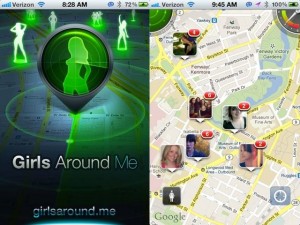We talked about online privacy and what is public in the web. Usually people think that everything is public in the web.
I’m posting about this app Girls around me, because I think that privacy issues are important. Apple removed the app on last Saturday.
The idea of the app is that the user can see women near by when logged in. Application gatheres GPS location data and puts it in Google map and merges Facebook and Foursquare data. If the Facebook privacy settings are “less computer-affable” (not strict enough) all the photos and private information are also visible in the Girls around me application.
Web culture is about being visible in the web. However, I think there is a difference when it is done by the user, and when there is a software gathering information with out consent. I don’t like the idea that if you can not protect yourself in the web, it’s perfectly fine to misuse the personal information. There are dating mobile apps for those who want to use them.


It’s interesting how we can have so many different insights on what’s private and public in the internet. I am a believer that anything that you post online is, to some extent, public, because it happens that once you publish something there’s no way around, even in Facebook when you have the best private conditions if your friends downloads a picture of you it is out of your power what could happen to that picture. But even though anything can be potentially public there must be some kind of way to protect your information, in the Facebook case they are the private settings of your account, because even if your friends can use your information and data it’s only because you are allowing them to do so.
That’s why I agree with you when you say you’re against this kind of software because it’s a completely different thing when someone forces the access to your personal data, and it’s the reason why hacking is illegal.
Interesting points you make about public/private and internet. Could the app also be studied in a different way/perspective? How is sexuality constructed in the app? Is is queer? Is it heteronormative? Other theoroes or concepts that have been mentioned in the course that could be used?